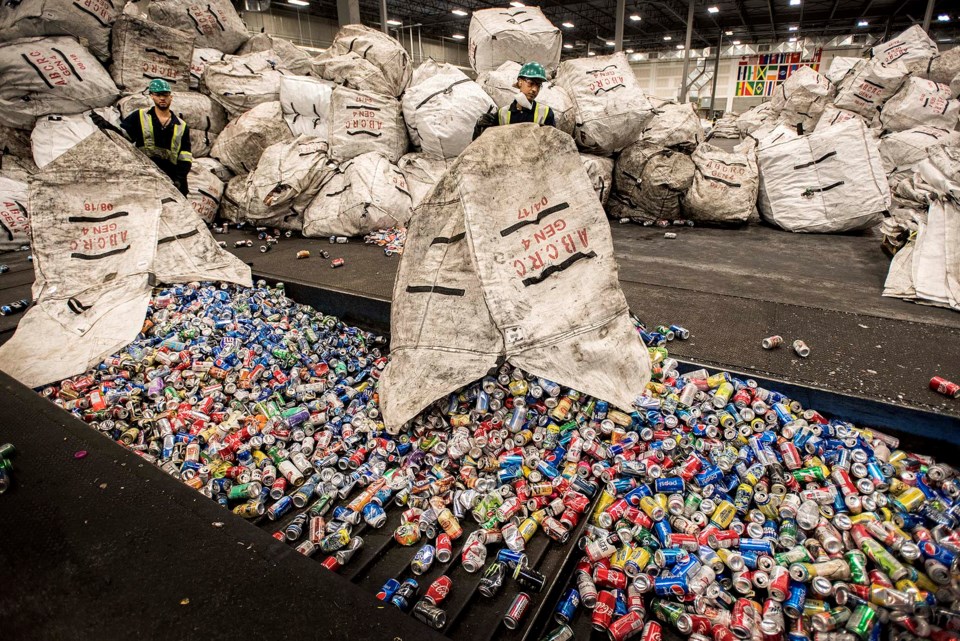Albertans could keep more bottles out of the landfill if they tapped into the power of gambling, research by a former St. Albert resident suggests.
University of British Colombia PhD student Jade Radke co-authored a study earlier this month on the effects of probabilistic refunds on beverage container recycling.
Radke, who grew up in St. Albert, works with the UBC’s Behavioural Sustainability Lab, which aims to use psychology to promote conservation.
Psychologists have long known that people prefer to have a small chance to win a big prize over having a guaranteed shot at a small one, Radke said. Her team sought to see if this gambling principle could be used to boost recycling rates.
Bottle lotto
Radke’s team set up mock bottle depots in Vancouver and at the 2024 Spruce Grove RibFest to run three experiments involving a total of 975 people. For the first two, participants brought in bottles to recycle and were asked to pick between a guaranteed $0.10 per bottle or gamble on a 10, 1, 0.1, or 0.01 per cent per bottle shot at $1, $10, $100, or $1,000, respectively. They also had to rank how happy they felt about their decision. The last test saw participants randomly assigned either the guaranteed or 0.01 per cent options. Participants then got money based on their choice.
The team found participants were more likely to pick the gambling options than the guaranteed payout, with 26 per cent of those in the first test and 39 per cent in the second picking the 0.01 per cent chance to get $1,000. Those that went for the gambles also reported about four per cent more happiness than those who took the guaranteed payout. Radke said the gamblers did not appear to be less happy than those who took the guaranteed payout even though no one won the $100 or $1,000 prizes.
The study also found participants who picked the gambling options brought in 47 per cent more containers than those who picked the guaranteed payout. Extrapolated to the entire U.S., this suggests that lotto-based recycling could cause about 1.9 million more tonnes of containers to be recycled each year and keep some 4.3 megatonnes of greenhouse gas emissions out of the air.
A good bet?
Alberta is already pretty good at bottle recycling — it had the highest recycling rate in Canada and second-highest in North America at about 85 per cent last year — but it could be better, Radke said. Norway recycles about 97 per cent of its beverage containers, which could be due in part to its lotto-based system, where people drop bottles into reverse vending machines and choose either a flat per-bottle payout or a chance at big prizes.
Radke said lotto-based incentives can encourage other good behaviours. Last January, her team published a study that showed how people were more likely to bring in a reusable cup to a coffee shop if doing so got them a chance to win a free coffee.
Radke said a lottery system wouldn’t cost any more than a regular deposit system, as you can tweak the odds to give it the same average payout per person. Still, she said people should always be allowed to choose between the lottery and a guaranteed return, as some people might prefer or rely upon the latter.
Radke said she and her team were now working with B.C.’s Encorp Pacific to set up a recycling lottery, and hoped to partner with similar organizations in Alberta.
In an email, Nick Ford of the Beverage Container Management Board (which runs Alberta’s deposit return system) said that while Radke’s study had promising results, any changes to Alberta’s beverage container recycling system required careful study.
“Though the thrill of winning could boost short-term engagement, the BCMB must carefully consider the long-term risks,” he said, such as costs, lottery burnout, and impacts on those who rely on guaranteed returns for income.
Radke’s study is available in the Aug. 1, 2025, issue of Waste Management.




